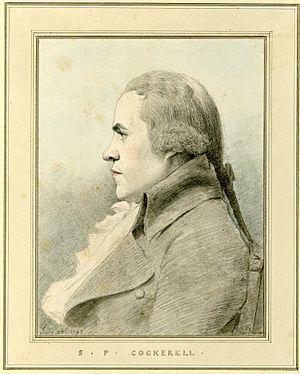Samuel Pepys Cockerell facts for kids
Quick facts for kids
Samuel Pepys Cockerell
|
|
|---|---|
 |
|
| Born | 15 February 1754 |
| Died | 12 July 1827 (aged 73) |
| Nationality | British |
| Occupation | Architect |
| Spouse(s) |
Anne Whetham
(m. 1782) |
| Children | 11, including Charles |
| Buildings | Sezincote House |
| Projects | Bayswater |
Samuel Pepys Cockerell (born February 15, 1754 – died July 12, 1827) was a talented English architect. He was a great-great nephew of the famous diarist Samuel Pepys. Samuel is best known for designing Sezincote House in Gloucestershire. This unique house had an "Oriental" or Indian-inspired style. It even influenced the more extravagant Brighton Pavilion.
Contents
Life and Work
Samuel Pepys Cockerell learned his skills from a famous architect named Sir Robert Taylor. Samuel often said he owed his early success to Taylor. His first job was in 1774 as a Surveyor for St George's Hanover Square in London. A surveyor is someone who plans and oversees building projects.
Working for the Government
In 1775, Samuel joined the Royal Office of Works. This was a government department that managed royal buildings. He became a Clerk of Works at the Tower of London. This job was mostly honorary, meaning it paid well but didn't require much daily work. He also got a similar job at Newmarket in 1780. However, he lost these positions in 1782 when the Office of Works was reorganized.
Major Projects and Estates
After Sir Robert Taylor passed away in 1788, Samuel took over as Surveyor for the Foundling Hospital and Pulteney estates. The Foundling Hospital was a well-known charity for abandoned children. The Pulteney estates were large areas of land in London. In 1790, he created a plan to develop the Foundling Hospital's land in Bloomsbury, London. This project went ahead as he planned.
Samuel also continued Taylor's work on Admiralty House in Whitehall. This building was designed to be the home for the head of the British Navy. He worked on it from 1786 to 1788.
Designing London Areas
Cockerell designed many buildings in the Bayswater area of London. This included streets like Sussex Gardens. He also made plans for other city developments. As the surveyor for the Bishop of London, he planned to build on the church's land in Paddington. However, only a small part, Connaught Square, was started before he died.
From 1806, he worked as a Surveyor for the Honourable East India Company. This powerful company managed trade and rule in India.
Country Houses
Besides Sezincote, Samuel designed Daylesford, Gloucestershire. This house was for Warren Hastings, a wealthy British person who had lived in India. Daylesford was built with plain, warm-colored stone walls. It had a unique round section with a low dome on the garden side. This dome had a subtle Indian touch.
Samuel also designed Middleton Hall in Carmarthenshire. Today, this is home to the National Botanic Garden of Wales.
His Students and Legacy
Many architects learned from Samuel Pepys Cockerell. One of his students was Benjamin Henry Latrobe. Latrobe later moved to the United States and worked on famous buildings like the White House and the United States Capitol. Samuel's own son, Charles Robert Cockerell, also became a very famous architect after training with his father.
Samuel Pepys Cockerell was also the Surveyor to the Fabric of St Paul's Cathedral from 1811 to 1819. This meant he was in charge of maintaining the famous cathedral.
Family Life
Samuel married Anne Whetham on June 18, 1782. They had eleven children together, five sons and six daughters. His son, Charles Robert Cockerell (1788–1863), followed in his footsteps and became a well-known architect. Another son, Richard Howe Cockerell, became a Captain in the Royal Navy.
Samuel's elder brother, Colonel John Cockerell, bought the land where Sezincote House was built. He then left it to their younger brother, Charles. Charles later became Sir Charles Cockerell, 1st Baronet. Between 1805 and 1820, the Cockerell brothers worked together to design and build the beautiful Sezincote House.
 | Valerie Thomas |
 | Frederick McKinley Jones |
 | George Edward Alcorn Jr. |
 | Thomas Mensah |

